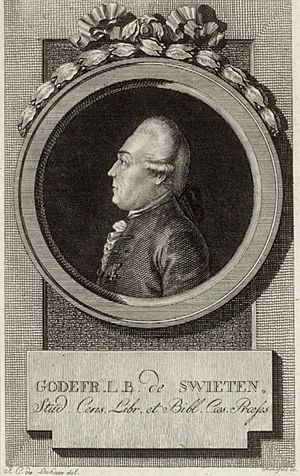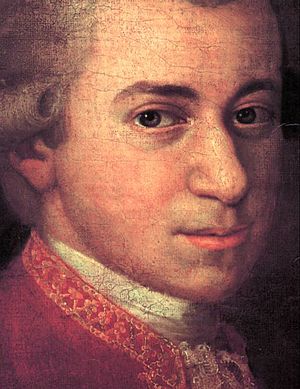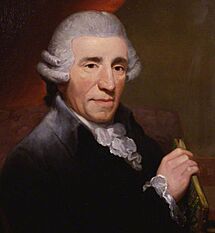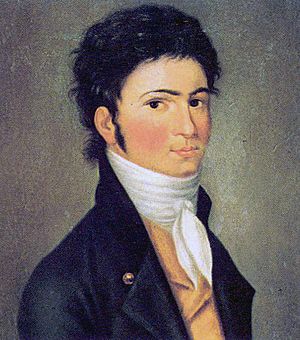Gottfried van Swieten facts for kids
Gottfried Freiherr van Swieten (born October 29, 1733 – died March 29, 1803) was an important person from Austria who was born in the Netherlands. He worked as a diplomat, a librarian, and a government official for the Holy Roman Empire in the 1700s. He loved music and is best known today for supporting famous composers like Carl Phillip Emanuel Bach, Joseph Haydn, Wolfgang Amadeus Mozart, and Ludwig van Beethoven.
Quick facts for kids
Gottfried Freiherr van Swieten
|
|
|---|---|
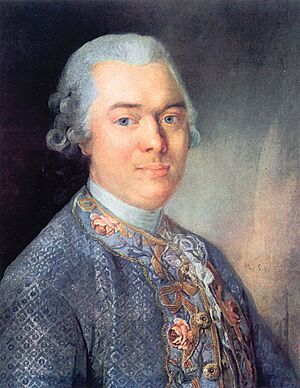 |
|
| Born |
Godefridus Bernardus "Godfried" van Swieten
October 29, 1733 |
| Died | March 29, 1803 (aged 69) |
| Education | Theresianum, a Jesuit school in Vienna |
| Occupation | diplomat, librarian, official |
| Parent(s) |
|
Contents
Life and Work
Gottfried van Swieten was born in Leiden, a city in the Netherlands. He grew up there until he was 11 years old. His father, Gerard van Swieten, was a famous doctor who made medical research and teaching much better.
In 1745, Gottfried's father became the personal doctor to Empress Maria Theresa, who ruled the Holy Roman Empire. So, the family moved to Vienna. His father also became the head of the court library and worked in other government jobs. Young Gottfried went to a special school called the Theresianum, which was run by Jesuits, to prepare for a career in government.
As a Diplomat
Gottfried van Swieten was very good at his studies and could speak many languages. Because of this, he became a diplomat. A diplomat is someone who represents their country in other countries.
He worked in different cities like Brussels, Paris, and Warsaw. Later, he became the ambassador (a top diplomat) to the court of King Frederick the Great in Berlin from 1770 to 1777.
This job was very important. King Frederick had previously taken land from Austria. Van Swieten had to try and get some of that land back. King Frederick joked that Van Swieten must think he had "gout in the brain" to ask for it back! Van Swieten didn't get the land back, but he helped with a big agreement called the First Partition of Poland in 1772.
During his time as a diplomat, Van Swieten also spent a lot of time on his love for music. In Berlin, he studied with a student of the famous composer J. S. Bach. He also spent time with Princess Anna Amalia, where they often played music by Bach and Handel.
As a Librarian
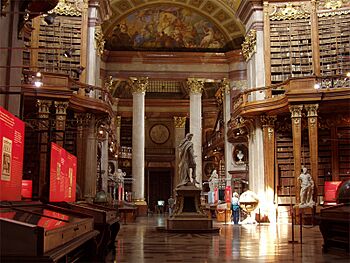
When Van Swieten returned to Vienna in 1777, he became the head of the Austrian National Library. This job had been empty since his father passed away five years earlier. Van Swieten stayed in this important library role for the rest of his life.
As a librarian, Van Swieten made a big change: he introduced the world's first card catalog in 1780. Before this, library catalogs were in big, heavy books. Using cards made it much easier to add new books and find them quickly. Other libraries soon started using card catalogs too.
He also added many new books to the library, especially books about science. He also brought in old books from monasteries that had been closed down by Emperor Joseph II.
In Government
In 1780, when Joseph II became Emperor, Van Swieten's career became even more successful. He was given important roles, like being a State Councillor and Director of the State Education Commission. He also became the Director of a new Censorship Commission in 1782.
Van Swieten strongly supported Emperor Joseph's plans to make big changes to the empire. His position in the government was very important, almost like being a minister of culture. He worked to improve education and increase freedom of the press. This meant he had a lot of work to do, especially with supervising what was published.
In 1784, Van Swieten suggested that the Holy Roman Empire should have a copyright law. This kind of law protects the rights of creators, like musicians and writers. However, the Emperor said no to his idea. Some historians believe that if this law had been put in place, Mozart might have had an easier time as an independent musician.
Later, Van Swieten faced some problems. In 1787, the Emperor started a difficult and costly war. This caused problems in Austrian society and made it harder to continue the reforms. The Emperor blamed Van Swieten for some of the issues, especially regarding education and censorship.
The Emperor became very sick and died in 1790. His brother, Leopold, who was more traditional, took over. This made Van Swieten's position even weaker. He lost his important government job on December 5, 1791, which was also the day Mozart died.
As a Composer
Van Swieten was so interested in music that he also wrote his own compositions. He wrote comic operas and symphonies. However, his music is not considered very good and is rarely played today. Experts say his symphonies were "insignificant."
Some of his known works include three comic operas and ten symphonies (seven of which still exist).
Other Details
Van Swieten was financially comfortable. He inherited money from his father and was paid well for his government jobs. He was much richer than Mozart, earning about ten times more.
He never married. Unlike his father, who remained Protestant, Gottfried became a Roman Catholic, which was the main religion of the empire.
Van Swieten owned a famous painting called The Art of Painting by Johannes Vermeer. He inherited it from his father, though at the time, people didn't know it was by Vermeer.
Death
Van Swieten passed away in 1803 in Vienna.
Helping Classical Composers
Van Swieten was a patron to many great composers. This means he supported them financially, giving them money from time to time. It was like giving a tip, rather than a regular salary. For example, Joseph Haydn said that Van Swieten "patronized me occasionally with several ducats." This was a common way for wealthy people to support artists back then.
The relationship between a patron and an artist was not one of equals. Composers like Haydn would address Van Swieten with great respect, like "Your Excellency."
Mozart
Van Swieten first met Wolfgang Amadeus Mozart in 1768, when Van Swieten was 35 and Mozart was just 11. Mozart's family was visiting Vienna. Van Swieten was involved in the early plans for one of Mozart's operas, La finta semplice.
In 1781, after Mozart moved to Vienna, they met again. Mozart played music from his opera Idomeneo for Van Swieten and other important people. This helped Mozart get a commission for his opera Die Entführung aus dem Serail, which became a big success.
Discovering Bach and Handel
By 1782, Van Swieten invited Mozart to visit him regularly. He wanted Mozart to look at and play his collection of music by Johann Sebastian Bach and George Frideric Handel. Van Swieten had collected these old manuscripts during his time as a diplomat in Berlin.
Mozart wrote to his father, "I go every Sunday at twelve o'clock to the Baron van Swieten, where nothing is played but Handel and Bach." Mozart started collecting Bach's fugues (a type of musical composition).
Van Swieten also asked Mozart to rewrite some of these old pieces for different instruments so they could be played for guests. Mozart would also play Handel's oratorios (large musical works for orchestra and choir) on the keyboard, even singing some parts and helping other singers.
Meeting the music of these two great Baroque (an older style of music) masters had a huge impact on Mozart. He started writing his own fugues and suites, learning from their style. Later, he used what he learned to create some of his most famous works, like the C minor Mass and a piece in The Magic Flute.
The Society of Associated Cavaliers
Van Swieten and his friends enjoyed the Handel oratorios so much that they wanted to hear them performed by a full orchestra and choir. So, in 1786, Van Swieten started the Gesellschaft der Associierten (Society of Associated Noblemen). This group of wealthy nobles helped pay for large-scale concerts.
Mozart started conducting these concerts in 1788. The Society also asked Mozart to update four of Handel's works for their performances. Van Swieten translated the words from English to German for these pieces.
These concerts were very important for Mozart because he was having money problems at the time. Van Swieten remained loyal to Mozart. In 1789, Mozart tried to get people to sign up for a concert series, but after two weeks, Van Swieten was the only one who had signed up!
Mozart's Death
When Mozart died on December 5, 1791, Van Swieten went to his home and helped arrange the funeral. He also helped Mozart's wife, Constanze, and even helped arrange for Mozart's son, Karl, to get an education.
Haydn
In 1776, Van Swieten encouraged Joseph Haydn. Haydn was feeling down because some critics in Berlin didn't like his music. Van Swieten told him that his music was very popular in Berlin, which made Haydn feel better.
In 1790, Haydn became more independent from his long-time employers, the Esterházy family. He moved to Vienna and could accept Van Swieten's support more easily. Haydn likely took part in the Handel concerts.
After Haydn returned from London in 1795, he and Van Swieten worked very closely together. Van Swieten became Haydn's librettist (the person who writes the words for an opera or oratorio) and artistic adviser.
Their collaboration started with a smaller work called The Seven Last Words of Christ. Then, they moved on to much bigger projects: the famous oratorios The Creation (1798) and The Seasons (1801). Van Swieten translated and adapted the stories for these works. He also translated the German words back into English so that the music could be enjoyed by both German and English speakers.
Van Swieten also gave Haydn many ideas for how the music should sound in different parts of the oratorios. Haydn usually followed these suggestions closely. For example, in The Creation, Van Swieten suggested how God's words about animals multiplying should be sung.
The first performances of The Seven Last Words, The Creation, and The Seasons were all supported by Van Swieten's Society of Associated Noblemen.
Beethoven
Van Swieten also supported Ludwig van Beethoven when Beethoven was young and just starting his career in Vienna. Beethoven's experience was similar to Mozart's. He visited Van Swieten's home, where they regularly played music by Bach and Handel.
One of Beethoven's early biographers said that these evenings had a big impact on Beethoven. He often had to stay late, playing Bach fugues for Van Swieten, who loved music so much he didn't want Beethoven to leave.
We know Van Swieten invited Beethoven because of a letter from 1794. Van Swieten wrote to Beethoven, asking him to come to his home at 8:30 in the evening with his "nightcap in your bag." This meant he wanted Beethoven to stay late, and if he returned home after the city's 9 p.m. curfew, he would have to pay a fee to get into his locked house.
Being exposed to Bach and Handel's music was important for Beethoven, just as it was for Mozart. Beethoven valued Mozart and Handel the most, then Bach.
In 1801, Beethoven dedicated his First Symphony to Van Swieten, showing his respect and gratitude.
Other Connections
Earlier in his career, Van Swieten also supported Carl Philipp Emanuel Bach, another son of J. S. Bach. Bach wrote six symphonies especially for Van Swieten.
Johann Nikolaus Forkel, who wrote the first biography of J. S. Bach, dedicated his book to Van Swieten.
Van Swieten and Music Customs
Van Swieten helped change how people listened to music. In his time, it was common for musicians to play mostly new music, often their own. But Van Swieten was one of the first to strongly encourage playing older music, especially from Bach and Handel. He believed that studying old masters was important for musicians.
He wrote that he belonged to a generation that believed in studying music thoroughly. He found strength in the music of Handel and the Bachs, and he encouraged modern composers to learn from them.
At first, this idea of focusing on older music was not very common. But as Van Swieten's concerts of The Creation and The Seasons became popular, more people started to agree with him.
Van Swieten also believed that audiences should be quiet during concerts so everyone could hear every note. This was not always the case in the 1700s, where people often talked during performances. If people whispered during a concert, Van Swieten would stand up, look at them seriously, and then slowly sit back down. This usually made them stop talking.
What People Thought of Van Swieten
Some people described Van Swieten as a bit stiff. Haydn once said that Van Swieten's symphonies were "as stiff as the man himself." He kept a formal distance from the composers he supported, which was common for nobles at the time. One person said he was "not so much a friend as a very self-opinionated patron." He wasn't very close to other nobles either and preferred a quiet life after 1795.
When it comes to his work as a librettist (writing words for music), some critics think his later works for Haydn were not as good.
However, Van Swieten's taste in music is generally praised. He chose to support composers who are now considered some of the greatest in history: Bach, Handel, Gluck, Emanuel Bach, Haydn, Mozart, and Beethoven.
Images for kids
See also
 In Spanish: Gottfried van Swieten para niños
In Spanish: Gottfried van Swieten para niños


